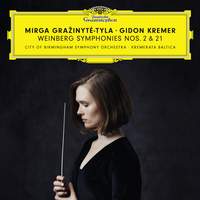Recording of the Week,
Mirga Gražinytė-Tyla conducts symphonies by Mieczysław Weinberg
Lithuanian conductor Mirga Gražinytė-Tyla has made a hugely impressive mark since she took over from Andris Nelsons as Music Director of the City of Birmingham Symphony Orchestra in 2016, and we were delighted to hear that she has signed an exclusive contract with Deutsche Grammophon. For her debut DG recording she has chosen two symphonies by the Polish-born Soviet composer, Mieczysław Weinberg (1919-1996).
 Mirga is certainly no stranger to Weinberg's music, having previously recorded his Chamber Symphony No. 4 with Kremerata Baltica. She is reunited with them for this performance of Symphony No. 2, written in 1946 for string orchestra. If I had to sum up Weinberg's style, I would say that there is a heavy dose of Shostakovich in the often bleak string writing, with an occasional whiff of Mahler. At the very beginning of the symphony I was even put in mind of Bach, where the outline of a G major broken chord from the cellos caused the Prelude of the first Cello Suite to pop into my head.
Mirga is certainly no stranger to Weinberg's music, having previously recorded his Chamber Symphony No. 4 with Kremerata Baltica. She is reunited with them for this performance of Symphony No. 2, written in 1946 for string orchestra. If I had to sum up Weinberg's style, I would say that there is a heavy dose of Shostakovich in the often bleak string writing, with an occasional whiff of Mahler. At the very beginning of the symphony I was even put in mind of Bach, where the outline of a G major broken chord from the cellos caused the Prelude of the first Cello Suite to pop into my head.
For me the highlight of this symphony is undoubtedly the Adagio second movement. After a long melody for violas and cellos, the bulk of the movement consists of the desolate and yet somehow hopeful Shostakovich-infused string writing that I mentioned earlier. It's here also that the Mahlerian influence comes into play: with high violin notes surrounded by gentle string chords, I was reminded of the closing pages of Mahler's Ninth Symphony, while elsewhere some of the surging harmonies also gesture towards Sibelius's Seventh Symphony. It's a stirring performance that shifts through the varying moods effortlessly and had me unfailingly enthralled. The serene C major chords that close this movement are exquisitely performed.
We then jump to 1991, with Weinberg's last completed symphony, No. 21, performed here by the joint forces of Kremerata Baltica and the CBSO. Subtitled Kaddish, the work is intended as a memorial for Holocaust victims from the Warsaw Ghetto. It's a sprawling work that quotes from his earlier pieces as well as from the music of Chopin: in several places we hear the sound of a piano playing fragments of the G minor Ballade, breaking through the texture like the oppressed yet defiant voice of the Polish people.
As well as these specific references, the music often shifts stylistically; there's an extended passage about eleven minutes in where, against a haunting accompaniment of harp and piano, a solo violin intones a kind of ghoulish lullaby, chillingly played here by Gidon Kremer as he thins his tone out to little more than a ghostly whisper. A twisted version of this music comes back later, where a solo clarinet, violin and double bass form a kind of frenzied klezmer band.
Elsewhere there are wonderfully evocative touches of orchestration, whether it be a trumpet duet that reminded me of part of Stravinsky's The Rite of Spring, the hollow sound of a xylophone, or the gently soothing timbre of an harmonium. It is in the symphony's final section that Weinberg introduces perhaps the most poignant effect of all: the floating sound of a wordless soprano (perhaps in a subtle nod to Leonard Bernstein's Symphony No. 3 with the same subtitle, which also features a solo soprano).
Although the symphony uses a large orchestra overall, often Weinberg hardly has any instruments playing, and this is true here, where the voice is accompanied by nothing more than long notes from cellos and basses, with occasional interjections from solo clarinet and violin. After one final orchestral outburst, the players gradually drop out to be left with one barely-audible long note from the cellos, eventually fading to nothing. After the turbulence that has occurred, it's a simple and yet profoundly moving way to end this most contemplative work. In relation to her exploration of Weinberg's music, the booklet notes quote Mirga as saying that “The journey has just begun!”. On the evidence of this recording, it is a journey that I am most eager to continue.
Gidon Kremer (violin), Kremerata Baltica, City of Birmingham Symphony Orchestra, Mirga Gražinytė-Tyla
Available Formats: 2 CDs, MP3, FLAC, Hi-Res FLAC



